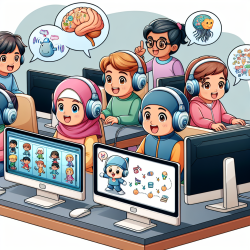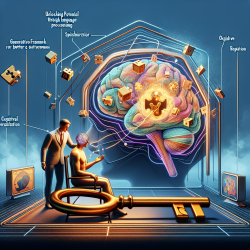In recent years, the intersection of technology and therapy has opened up new possibilities for enhancing cognitive and language skills in children with cochlear implants (CIs). One particularly promising approach is computerized cognitive training (CCT), which has shown significant improvements in working memory and language skills among these children. Let's delve into the findings of a pivotal study and explore how you, as a practitioner, can leverage these insights to create better outcomes for your young clients.
Understanding the Study
The study, titled "Computerized cognitive training for improving cochlear-implanted children's working memory and language skills," involved 51 children aged 6-12 years who had undergone CI surgery. The children were divided into two groups: a treatment group that received 20 sessions of cognitive computer training using Sina-Working Memory Training software, and a control group that received no intervention. The researchers used the Wechsler Working Memory Subtest and the Test of Language Development (TOLD) to assess the children's working memory and language skills before and after the intervention.
Key Findings
The results were compelling:
- Working Memory: The treatment group showed significant improvements in both auditory and visual-spatial working memory compared to the control group (P < 0.01).
- Language Skills: The treatment group also demonstrated enhanced performance in sentence imitation, word discrimination, and phonemic analysis subtests (P < 0.01).
Practical Implications
As a practitioner, these findings offer actionable insights that can be integrated into your therapeutic practices:
- Incorporate CCT into Therapy Sessions: Given the significant improvements observed, consider integrating computerized cognitive training into your therapy sessions. The structured and engaging nature of CCT can make it an effective tool for enhancing both cognitive and language skills.
- Focus on Early Intervention: The study suggests that the efficacy of these interventions is greater at earlier ages. Therefore, it is crucial to start these programs as early as possible to maximize the benefits.
- Monitor and Adjust: Regularly assess the progress of your clients using standardized tests like the Wechsler Working Memory Subtest and TOLD. This will help you tailor the interventions to meet the specific needs of each child.
Encouraging Further Research
While this study provides robust evidence supporting the efficacy of CCT, more research is needed to explore its long-term effects and broader applications. Practitioners are encouraged to contribute to this growing body of knowledge by conducting follow-up studies and sharing their findings with the scientific community.
Conclusion
The integration of computerized cognitive training into therapy for cochlear-implanted children offers a promising avenue for improving their working memory and language skills. By adopting these evidence-based practices, you can make a meaningful impact on the cognitive and language development of your young clients.
To read the original research paper, please follow this link: Computerized cognitive training for improving cochlear-implanted children's working memory and language skills.










